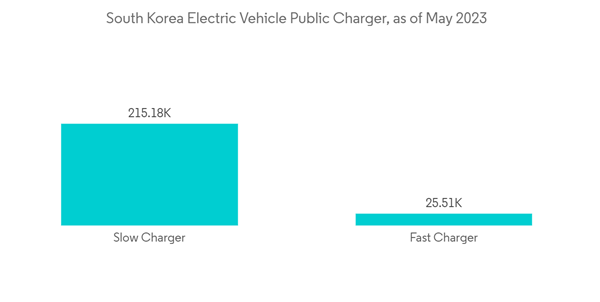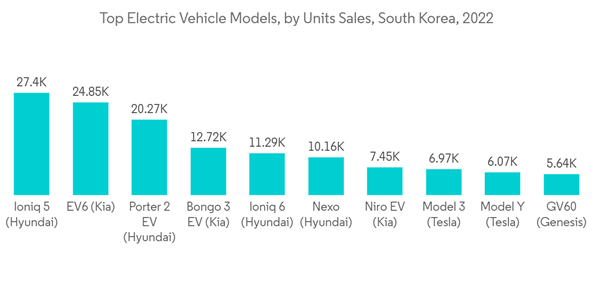Key Highlights
- Availability of government subsidies has been among the major driving factors for electric vehicle sales in South Korea. The government provides a subsidy of KRW 6.8 million (USD 5,400) per electric vehicle, which further varies with the price band of the vehicle. The full subsidy is applicable for vehicle prices below KRW 57 Million (USD 46,462). The availability of such subsidies is anticipated to encourage more buyers to opt for electric vehicles, driving the demand for EV batteries.
- Further, advancements in battery technology, such as increased energy density and cost reduction, can enhance the performance, range, and affordability of electric vehicle (EV) batteries. This, in turn, will increase the appeal and demand for EVs, as consumers will have access to vehicles with longer ranges, faster charging times, and more competitive pricing.
- LG Energy Solution Ltd, SK Innovation, and Samsung SDI, South Korea's three primary EV battery makers, are moving quickly to meet the rapidly expanding worldwide demand for EV batteries.
South Korea Electric Vehicle Battery Market Trends
Increasing Electric Vehicle Charging Station will Possess a Positive Outlook
- As of May 2023, the number of electric vehicle chargers in South Korea reached 240,695, of which 10.6% were fast chargers. The total number of chargers in the country has increased by around 17% when compared to the numbers at the end of the year 2022, which was 205,205.
- According to a report by the International Energy Agency, South Korea has the most established electric vehicle charging infrastructure per unit in the world, accounting for 2 EVs per charging point, wherein the global average was around EVs per charging point as of 2022. Moreover, South Korea had the greatest average kW per EV ratio of 7 kW, whereas the global average was 2.4 kW per EV in the year 2022.
- Seoul, the capital of South Korea, has more than 4 million vehicles, and the city is planning to replace 10% of them with electric vehicles by 2026. and to support this transition, 140,000 charging points will be required. Many initiatives are taken to ensure this drastic shift. For instance, in September 2022, Seoul announced that the city is planning to install around 220,000 charging stations in the next four years by replacing streetlights with streetlamp chargers with the capability to fully charge an electric car in an hour. Additionally, there will be more fast chargers installed adjacent to street parking places, while smaller bollards will accommodate slower chargers. Chargers will also be added to petrol stations and a few new solar-powered EV-focused stations.
- Many companies are also collaborating with automakers to establish charging stations across the country. For instance,
- In September 2022, Hyundai Motor Group and KT Corporation, a South Korean telecommunications company, expanded their business partnership area based on its core capabilities to expand their charging infrastructure across the country.
- Considering the growth in electric vehicle charging infrastructure, the demand for electric vehicles is anticipated to witness a consistent increase during the forecast period, which, in turn, will drive the demand for electric vehicle batteries.
Increasing Electric Vehicle Sales is likely to Shape the Demand Trajectory for Batteries
- South Korea is an overall lucrative market, given its technological superiority in battery manufacturing and significant EV sales (exports) in Europe, even though its domestic market lags well behind Europe, China, and the United States. In South Korea, hybrid electric vehicles have performed well, indicating a desire for alternate fuel cars and environmental concerns. The facts show that poor EV range and a lack of charging infrastructure are the main reasons for delayed EV adoption, which is likely to be taken care of by technological advancements. Many key automobile companies are actively investing in South Korea in order to expand their presence and cater to a wide range of customer base.
- For instance, in April 2023, Kia Corporation, a major South Korean automaker, broke ground on a new plant dedicated to the production of commercial electric vehicles (EVs) in South Korea. The facility, located in Hwaseong, will have an annual production capacity of 150,000 battery-electric purpose-built vehicles (PBVs), and the production is expected to start by the second half of 2025.
- Further, Key automobile companies are focusing on research and development, production facilities, and expanding EV charging infrastructure to drive innovation, meet growing demand, and support the wider adoption of electric vehicles in the market. For instance,
- In April 2023, Hyundai Motor Group, South Korea's leading automotive conglomerate, announced plans to invest USD 18 billion in the electric vehicle (EV) industry by 2030. The investment will focus on areas such as research and development, production facilities, and expanding EV charging infrastructure. Hyundai aims to enhance its position in the global EV market and achieve sales of one million EVs annually by 2025.
- Such factors are likely to ramp up the adoption of electric vehicles in South Korea over the coming decade, which is likely to fuel the demand for electric vehicle batteries during the forecast period.
South Korea Electric Vehicle Battery Industry Overview
South Korea's electric vehicle (EV) battery market is highly competitive, with few key players holding the majority of the market share. LG Energy Solution Ltd stands as a leading manufacturer, providing batteries to global automakers. Samsung SDI Co. Ltd is another prominent player, supplying EV batteries to domestic and international customers. SK Innovation Co. Ltd is recognized for its significant presence in the EV battery industry.Hyundai Motor Group and Kia Corporation, both South Korean automakers, have made substantial investments in EV battery production to support their own EV models. Other notable companies include Hyundai Mobis and Enertech Co. Ltd. This vibrant, competitive environment drives innovation and contributes to South Korea's position as a key player in the global EV battery market.
Additional Benefits:
- The market estimate (ME) sheet in Excel format
- 3 months of analyst support
This product will be delivered within 2 business days.










